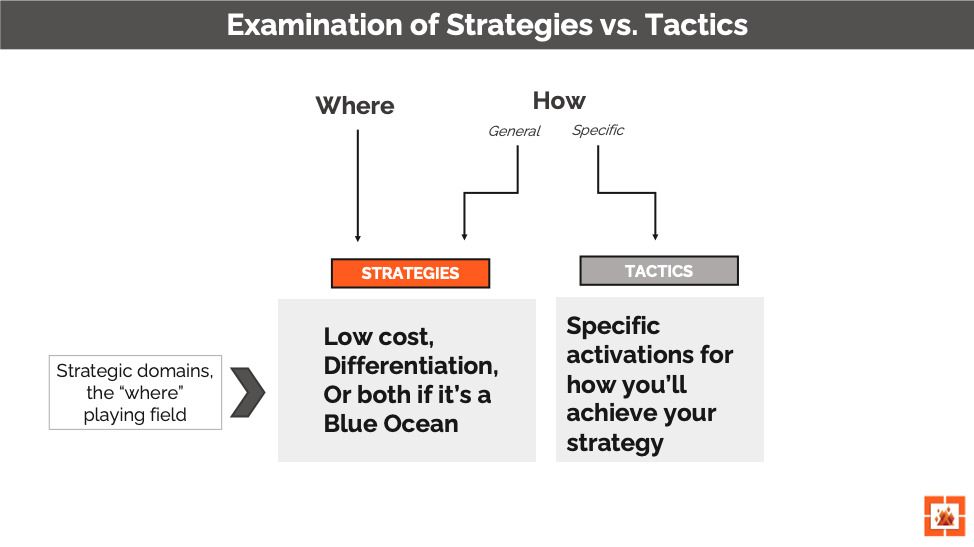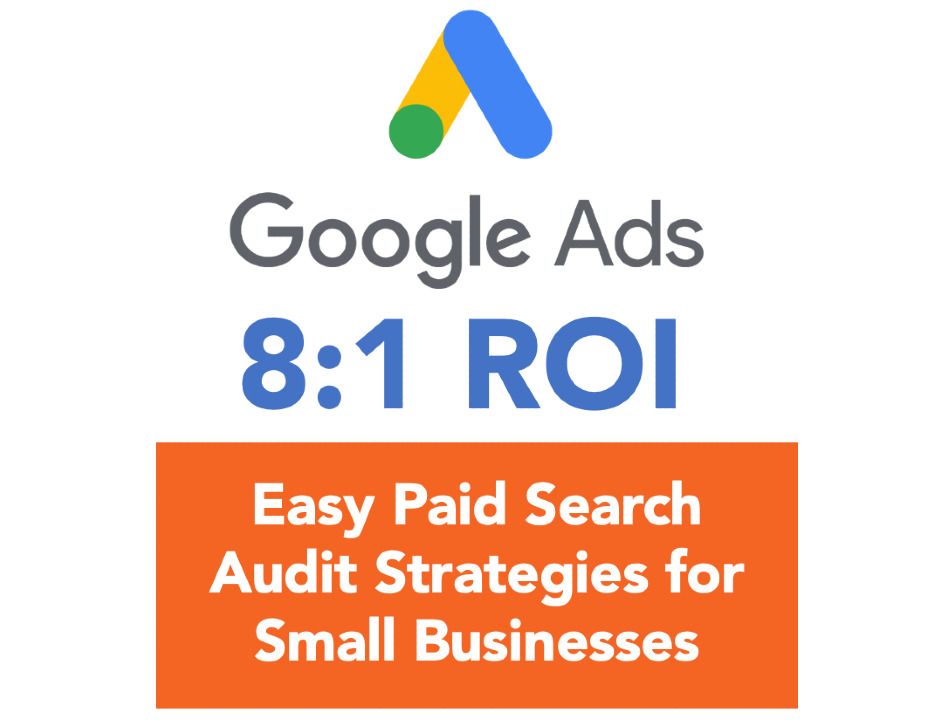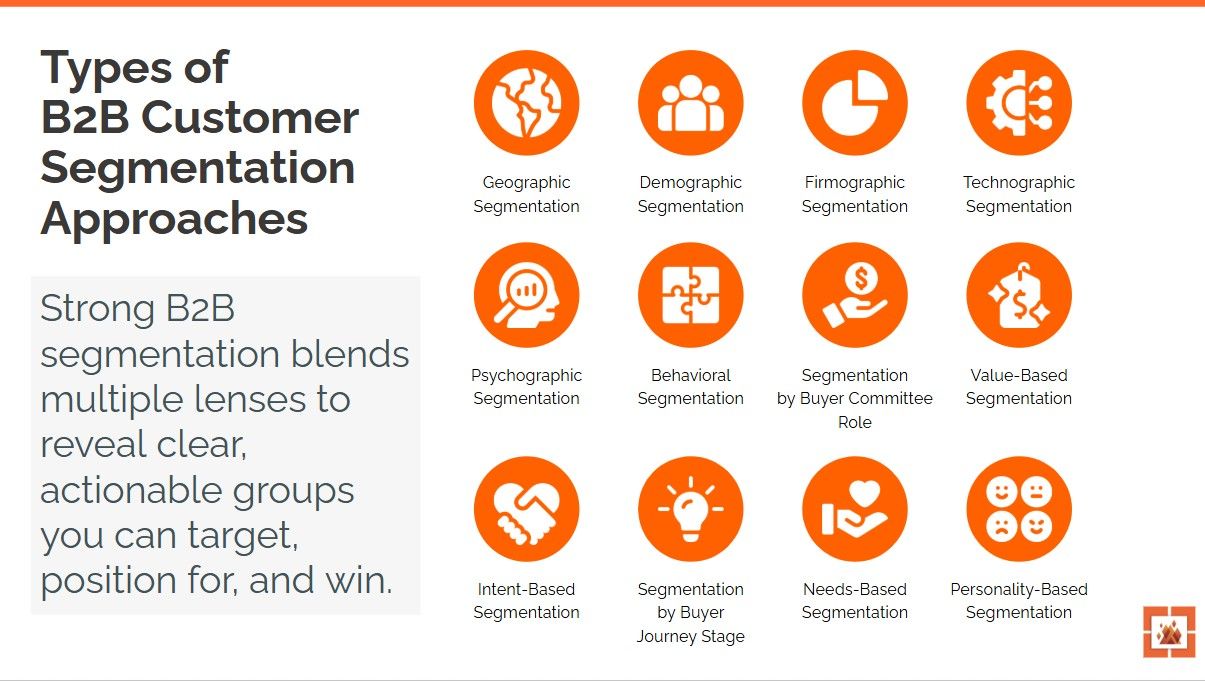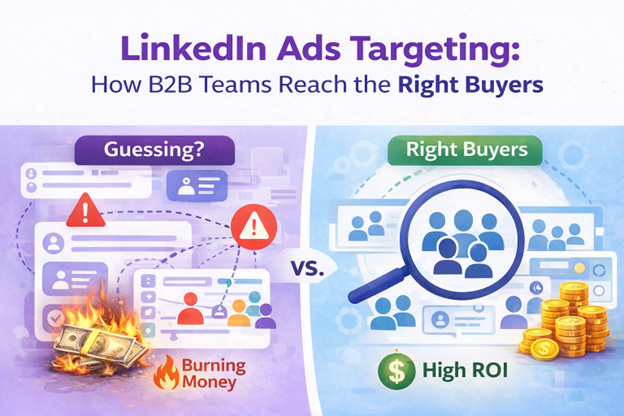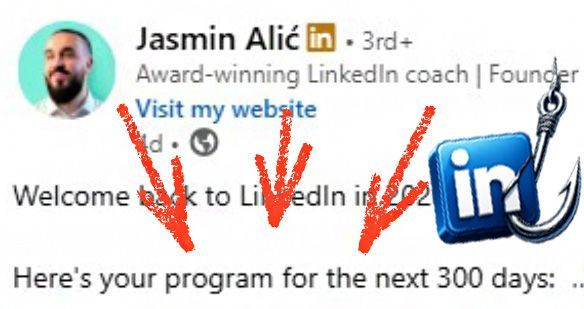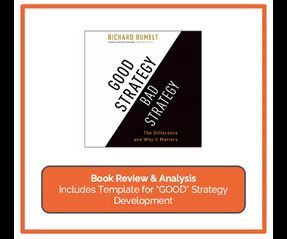Is a Fractional CMO Worth It? The Answer with a Pros and Cons Force-Field Analysis
By Adam Fischer • October 12, 2023
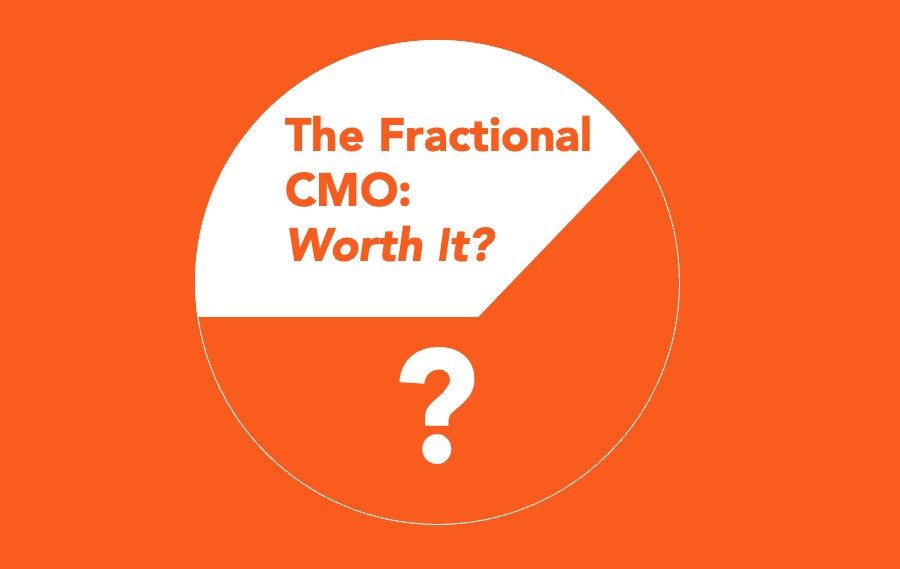
What is a fractional CMO in simple terms?
Simply put, a fractional CMO provides strategic marketing guidance and helps execute it a part time leadership role as a contracted member of your marketing team.
They are someone with broad as well as specialized experience in building brands and driving business growth. As a part-time CMO, they’re different than a full time CMO because they have other clients; this can be both an advantage and disadvantage to the relationship. A fractional CMO will have an intense curiosity and desire to get to know your customer and developing marketing initiatives to get more of them. They help you manage your entire marketing department to solve the biggest challenges you face. They should complement your current business capabilities, and be humble individuals despite their deep expertise.
This article provides a comprehensive overview of a Fractional CMO's responsibilities, how much they work and earn, the advantages and disadvantages of hiring them, and how you can get started, and a bit on how to find one. Towards the end of the article, you'll find a visual force field analysis that assigns value to the pros and cons of hiring a fractional CMO to aid in your decision making process.
Acting as a fractional CMO myself, I hope you find this article useful. I've taken measures to ensure I give you a well balanced picture with all the cons and drawbacks for you to consider that other content may glance over.
What business problem does a fractional CMO solve?
Entrepreneurs and small business leaders are notorious for being good at building a business, but bad at marketing it for growth. Small business and start-up leaders typically find themselves focused on managing operations, business model development, and all the other priorities of running a business: marketing often ends up being de-prioritized and pushed to the side.
Additionally, the word marketing doesn’t always hold a positive connotation, and business owners are often afraid of associating with it because they find it egotistical or manipulative.
I’ve spoken with countless small business owners who’ve tried hiring a marketing agency or spending money on paid ads, like Google, and had a bad experience and no results. The standard comment is something like “My company spent $40k on Google ads a few years ago and I don’t think we got anything out of it.”
The root cause of this ineffective marketing is typically the acute lack of marketing leadership and no understanding of who your customer really is; a fractional CMO acts as the key to unlock how to attract your ideal customer and wisely allocate your marketing dollars. If you have a strong core business but challenges around getting leads and acquiring new customers, a fractional CMO can help you craft a growth engine to scale.
How many hours does a fractional CMO work?
This of course varies, but I’ve seen 5-20 hours per week as the standard. 10 hours a week is an average time commitment, and what I personally find works best.
How much does a fractional CMO cost?
The range here is varied as well, in the ballpark of $75 to $750 dollars per hour. A sweet spot average charged for someone who has 10+ years of experience and a solid track record will be around $200. The industry you’re in, complexity and scope of the project, contract duration, and availability of qualified individuals with the skillset you need will have a major weighting on cost.
How to ensure a good fit when hiring a fractional CMO
You’ll want to map your business challenges with the fractional CMO passions and experience. If your goal is to build a strong visual brand identify, does this person have a strong track record there? Does the person have the industry knowledge, or experience in my exact vertical? If you want to build a sales funnel or marketing automation strategy, does the person have the technical chops and know how to guide this process?
Given the importance of this person’s role in your organization, I recommend having a fractional CMO candidate take a strengths assessment, such as the high 5 test.
Similar to the Gallup’s Strengths Finder assessment, but free, this psychometric test gives you a view of what the candidate is good at, as well as where their passions lie and what energizes them.
Counterintuitively, you want to find someone that might turn you down. The great ones out there pick and choose who they want to work with and will even have a waiting list.
Fractional CMO services and responsibilities include:
- As a senior marketing executive, they work with your management to mesh with your overall business strategy and corporate level strategy and define a winning marketing plan.
- After assessing your current marketing efforts, the fractional CMO shares a plan that lays out the gaps in your approach and accompanying strategies and tactics to fill them
- Help identify or flesh out your value proposition with an intense focus on customer needs and the customer experience
- By understanding the relative value that your product or service provides, the fractional CMO can propose value-based pricing strategies to ensure you maximize profitability
- Help hiring the right marketing talent to build the team you need, or manage a marketing agency on your behalf
- Identify trends in the market, competitive set, and your customers that you can capitalize on
- Build a paid, owned, and earned sales and marketing funnel to attract new customers and increase loyalty with your current customer base
- Paid Media Management: Everything from top funnel paid activities like direct mail, TV, paid social, and radio to bottom funnel actions like Google paid search (SEM)
- Owned Media: Owned asset strategy like your website and e-mail nurture plans, including marketing automation and conversion rate optimization (CRO)
- Earned Media: PR efforts like securing articles in relevant publications for your customer
- Brand identity and strategy work to ensure you’re building a unique brand presence that builds a bond with customers
- Aligns with business goals and sets marketing goals and KPIs you can measure in order to gain insights that helps you scale for immediate growth
- In most cases, you’ll want someone who is not only strategic, but digitally savvy and hungry for data analytics to optimize your campaigns – this is something everyone says they do, but rarely is it done is a meaningful and impactful way
Five Pros and Five Cons of Fractional CMOs
Pros of Hiring a Fractional CMO:
The benefits are centered around having a clear market leadership vision and accountability for results.
1. Expertise & Fresh perspective: a new and hungry visionary
- You get someone who has not been drinking the Kool-aid your company. They bring a fresh outlook, mindset, and playbook for how to look at things differently and win. If you have a distinct gap in customer loyalty, you can get someone who excels in exactly this area. Hiring a fractional CMO will give you an infusion of energy to start tackling new projects that drive growth.
2. Productivity: A strong GSD attitude to perform
- A good fractional CMO should be highly efficient, getting as much as possible done within the compressed time they have working on your business. Ideally, they’ve been there and seen it before, and can hit the ground running with quick wins from day one.
- As opposed to the standard fits and starts with marketing, you should have a unified strategy that’s all managed by the fractional CMO. They should take the burden off of senior management, and supercharge the efficacy of anyone else on the marketing team with high standards for producing.
3. Easy to hire and fire: Breaking up isn't hard to do
- The flexibility of being able to hire and fire someone much more easily can be a major benefit. Depending on the growth stage of your company, your needs will constantly evolve; you may need a digitally focused fractional CMO for 6 moinths and more of a brand strategist for the next evolution of your company. You don’t want to be frenetic, but you can easily change the shape of who you fire based on where your biggest problems to solve are.
- Tip: Depending on your needs, you can have a month to month longer duration commitment. Although a longer term commitment is viable in some cases, a month to month duration keeps flexibility for you, and motivation for the CMO, at its peak
4. Cost effective: More hourly cost, less annual cost
- Although you initially balk at the hourly rate, the annual pay for a fractional CMO is highly attractive and much less. A fractional CMO charging $150 per hour at 10 hours per week is only $78,000 per year, versus the annually salary of $312,000 hiring that same person at full time would cost you.
- Tip: The hourly nature could mean that the fractional CMO is incentivized to take longer to product results. The way you, as the business owner, can ensure this doesn’t happen is by monitoring productivity and making sure goals are being set, tracked, and achieved within appropriate time frames.
5. Accountability for Results: High performers at this level are driven by tangible results
- Having someone in a full-time position makes them more like part of the family, especially in small businesses. The fractional CMO is not about small talk at the water-cooler, they’ll enter your business and propose a plan with results attached to it, and be hyper-focused on proving their worth immediately. If they fail to meet those results, it’s easy to part ways and find a better fit. With results at the center of the relationship, you have a more motivated partner to continuously produce and demonstrate ROI to keep their contract intact.
Cons of Hiring a Fractional CMO:
Be careful of hype and the short terms nature of the role.
1. Hype & Ego: Always a worry when hiring a marketer, perhaps an even greater watch-out here
- Marketers are notorious for promising the world and overwhelmingly underdelivering. You need to have your radar on and detect if the person is all hype or the real deal. Fantastical adjectives like – “incredible results fast!” or “the ultimate growth secrets to 10x your business in 30 days” should start dinging the alarm bells for you to. Look elsewhere. Beware: buy the hype and have a downfall like Skype.
2. Short Term Focus: Quick wins at the cost of long term gains
- Though possibly a pro in terms of needing immediate results, the limited hours per week mean that building longer term plans may be constrained. If a 5 year strategy is what you’re looking for, you’ll need to be explicit about priorities and be willing to accept trade-offs against your short terms needs.
3. Stretched Thin: Too many clients, so you suffer
- Other clients and priorities mean your fractional CMO does not have you 100% on their mind. If they don’t enjoy working with you, your company culture, and the opportunity, they may give you a half-hearted effort. If your business has absolutely no notion of what marketing is and why it’s important, the fractional CMO may be able to work 2 hours a week and charge you 10, and you’ll still be happy with meager attention and results, simply because you don’t know any better. Similar to the caution against hiring someone all about hype and ego, do your best to seek out someone with integrity that you know has bandwidth to take on your projects.
4. Old Fashioned: Out of touch & not able to execute
- Some of the greatest CMO that ever lived may be the worst match for your company if they have the wrong thinking. Digitally channels have eclipsed traditional vehicles in terms of overall spend and ROI, but an old fashioned CMO may not be up to speed with what you need. You need to find a balance between someone who has that raw strategic intelligence you need to figure out what the priorities should be, but also someone who knows how to layer digital channels together, get a/b testing up and running fast, and the where with all to not just let Google Ads burn your dollars. A true blend of classical marketing and digital savvy is rare and in high demand.
5. Dislocation: Feeling the pain after departure
- Just like how Exxon may show up to your country, make you wealthy for 5 minutes, and then decimate the land and prosperity once they leave (wow that got heavy), the fractional CMO departing is a serious risk. If the fractional CMO creates an awesome plan, but is the only one who knows how to execute it and they leave, then you just lost your date to the prom (wanted a metaphor a bit lighter than the Exxon one). Make sure you are building capabilities within your organization, and getting adequate knowledge transfer from the fractional CMO. Ultimately, you want the fractional CMO to bring a sustainable marketing model to your company, not bring it to a halt when they leave.
I created a force-field analysis showing the pros and cons of hiring a fractional CMO. You can see that hiring a fractional CMO can offer significant advantages but the cons carry weight as well – what does this look like when you assign your own values to each section?
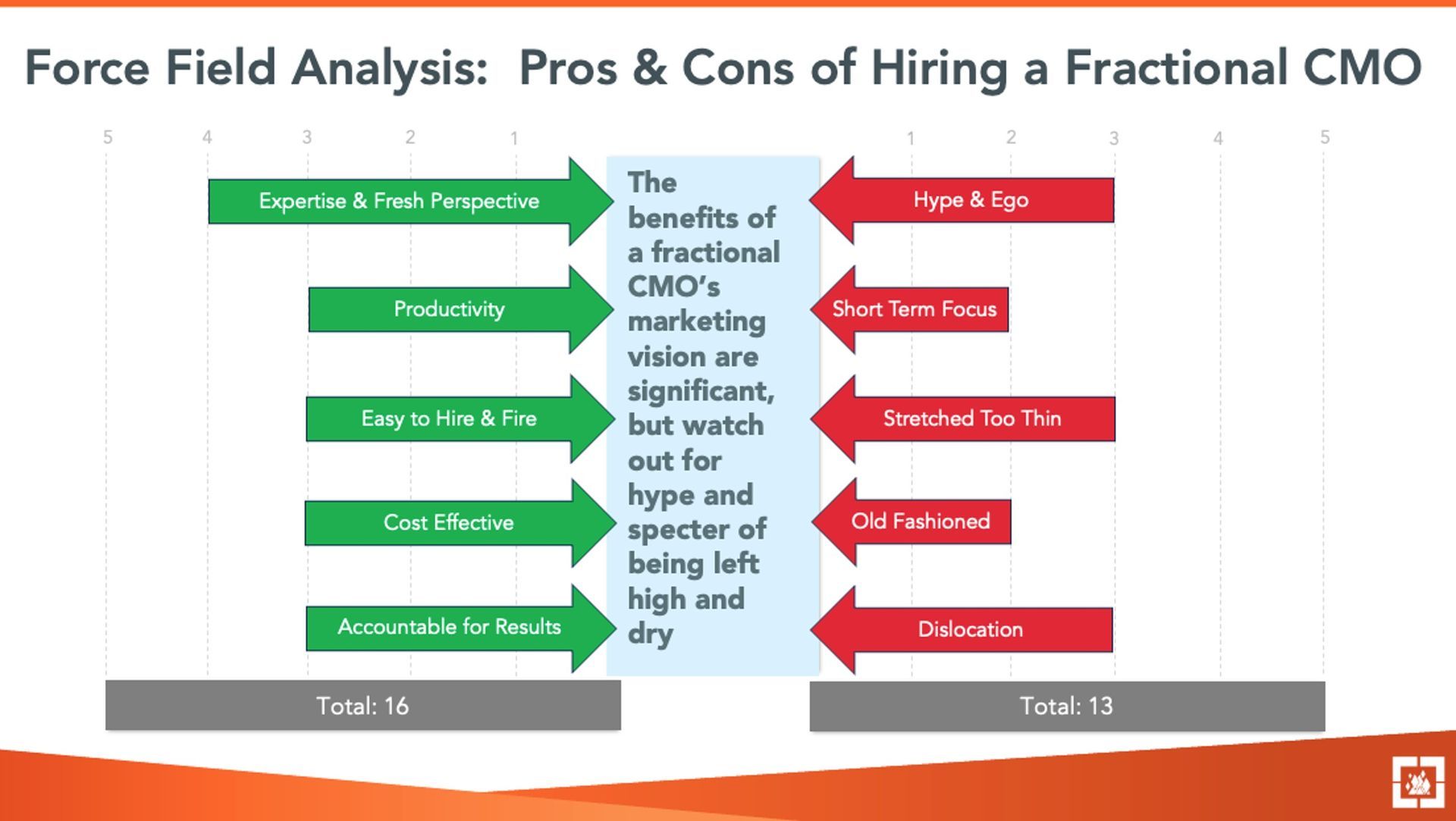
Conclusion – Do you Need a Fractional CMO?
After reading the above, you should have a better sense of whether or not a full time or fractional CMO model makes sense for your business. A good fractional CMO should make it seem like you’re in-housing your marketing department, not outsourcing it. In many cases, the fractional CMO may be your entire marketing department, but they typically need a team to help execute marketing functions.
If you’re downsizing your marketing efforts due to a challenging economy or reduced budget, a fractional CMO may serve as exactly what you need to keep marketing at the forefront while reaming cost effective.
Where to Hire a Fractional CMO
One of the most established fractional CMO hubs is Chief Outsiders - see what they have to offer here. If you want to work with Strategy Kiln, we’re happy to share our no hype approach to understand the critical factors of your situation that will drive growth.
Adam Fischer is a marketer with 10+ years of experience in brand management and digital marketing. He’s challenged conventional assumptions and taken bold moves to drive growth for small businesses like Dogeared Jewelry to multi-billion-dollar companies like CVS Health and Nature Made Vitamins. He leverages his B.S. in Philosophy from Northeastern University to ask questions that get to the heart of business issues, while his MBA in Marketing from the Thunderbird School of Global Management at ASU translates management philosophy into real strategic growth.
Insights to fuel your marketing business
Sign up to get industry insights, trends, and more in your inbox.
Contact Us
We will get back to you as soon as possible.
Please try again later.
Latest Posts
